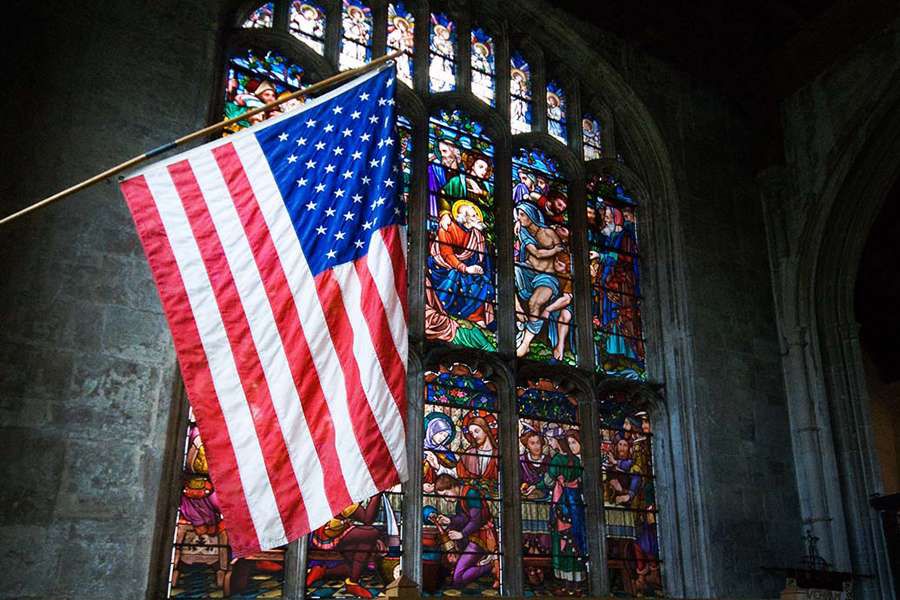Washington D.C., Oct 1, 2016 / 04:25 am (CNA/EWTN News).- Churches concerned about Internal Revenue Service intervention if they engage in political speech should take a look at a proposed federal bill that promises fewer restrictions, the bill’s backers say.
“No tax exemption can be based on a requirement that a church or any other non-profit organization give up a constitutionally protected freedom, including free speech,” Alliance Defending Freedom senior counsel Erik Stanley said Sept. 29. “With regard to churches, they can decide for themselves what they should or shouldn’t say from the pulpit. Americans don’t need the IRS to be the referee.”
Reps. Steve Scalise (R-La.) and Jody Hice (R-Ga.) have introduced the Freedom of Speech Fairness Act, which claims to restore free speech and religious freedom to churches and other nonprofits. It would allow churches to make political statements in the ordinary course of the organization’s regular and customary activities, and if any expenditures on such statements are minimal. The bill would ensure that a minister may make a comment about a political candidate or issue as part of a sermon. It would also allow a charity that sends out a monthly newsletter to occasionally include comments on political issues or candidates, according to Rep. Scalise’s office.
The bill maintains some restrictions. It would not allow non-profits to create an entirely new mailing campaign dedicated solely to political information. It would not allow non-profit organizations or churches to engage in political activities outside the scope of their normal tax-exempt work. They also could not contribute to political activities or candidates.
Stanley spoke in support of the bill, contrasting it with the 1954 Johnson Amendment. Lyndon Johnson, who would later go on to become president, backed legislation as a U.S. Senator to bar non-profits from participation in any political campaign on behalf of or against any candidate for public office. That rule is still in place.
For Stanley, the Freedom of Speech Fairness Act is a needed corrective. “The IRS has no business acting as the speech police of any non-profit organization, as its many scandals over recent years have made clear,” he said. “This bill corrects an unconstitutional restriction put in place in 1954 that was never intended to affect churches and other non-profit groups but has been used to intimidate them ever since.”
“By removing the threat of an IRS investigation and potential penalties based simply, for example, on what a pastor says from the pulpit, this bill brings the law into conformity with the First Amendment,” Stanley said. Rep. Scalise’s office said that present law creates a “chilling effect” on religious institutions’ speech.
In response to a 2012 lawsuit settlement with the Freedom from Religion Foundation, the IRS created a unit called the Political Activity Referral Committee. It identified 99 churches for “potential impermissible political campaign intervention activities.” Groups like Americans United for Separation of Church and State often send letters to pastors warning them about the tax regulations.
The U.S. Conference of Catholic Bishops’ Office of General Counsel has offered guidelines to Catholic organizations on political activity and lobbying. The July 2016 edition of the guidelines runs to 44 pages. It offers careful rules concerning candidate forums, debates, photo-ops and facility rentals at churches and other Catholic organizations. The guidelines are relevant to non-profit Catholic media organizations, including CNA’s parent organization the EWTN Global Catholic Network.
“Prudence dictates that Catholic periodicals reject columns that endorse, support or oppose candidates,” the bishops’ document states. It notes that Catholic news publications should avoid crossing the legal threshold of attempting “to promote or oppose a candidate through editorial policy” or through selective acceptance of political advertisements.
Alliance Defending Freedom organizes protests of the tax regulations in its Pulpit Freedom Sunday events. The U.S. bishops’ guidelines caution against Catholic churches’ participation in the event, saying it could cause problems with the IRS non-profit requirements. “If the IRS determines that an organization has violated this absolute prohibition against political campaign intervention, the IRS may revoke the organization’s tax-exempt status, including its ability to receive tax-deductible contributions,” the guidelines say.

